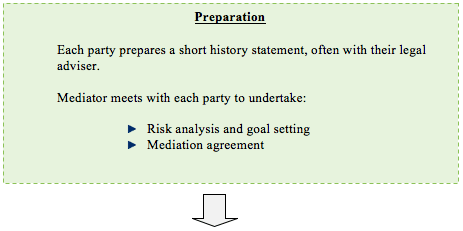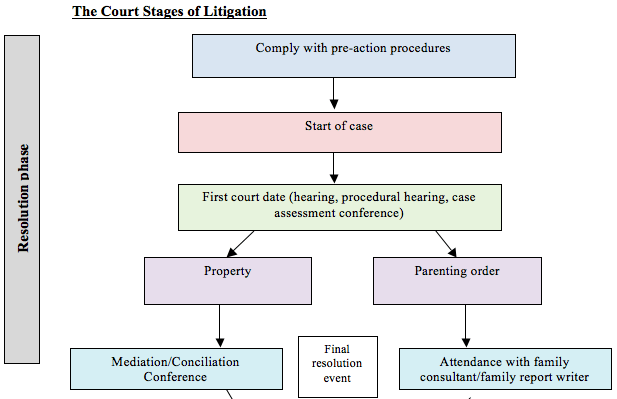- Fact finding and isolation of issues
At this stage the Mediator will obtain from you as much relevant information as possible, identifying the issues to be discussed and identifying any underlying conflict which may be associated with such issues. The issues will deal with such matters as property, financial assistance and the children.
Once the issues have been identified, the Mediator will then establish an agenda setting out the order in which the issues should be dealt with and which you believe would be the most appropriate way of dealing with such issues.
- Creation of options and alternatives
At this point, you and your partner will be looking at all the options and alternatives which could apply and which could be of assistance in resolving the issues which have been identified. By dealing with the options and alternatives, you will determine the most effective way of dealing with each issue. At this time, the Mediator will encourage you to be as creative as possible in setting up these options and alternatives.
- Negotiation and decision-making
At this point, you will be:
- Choosing options which you can best live with;
- Ensuring that you fully understand the details and implications of each proposal and what their consequences will be for you. This stage of the process may extend over one or two sessions. As you could imagine there will be a lot of discussion at this point in reaching agreement on those options and alternatives.
- Clarification of agreements reached
Hopefully, agreements will be reached on issues which have been isolated and discussed, and the Mediator will then prepare a written draft setting out your concerns, intentions, the facts agreed and decisions which have been reached. The agreement can also deal with your future dealings and relationships.
- Review of Process
At this point you can look at the matters that need to be made legally binding and determine the future review procedures required, if any.
- Implementation stage
This really speaks for itself in that the agreement is then put into practice.
What is the difference between Collaborative Practice and Mediation?
Mediation involves an independent neutral professional who facilitates discussions between the parties and helps them to reach an agreement. The Mediator does not provide legal advice to either party during the discussions.
In Collaborative practice, the lawyers provide advice to their clients and help them assess realistic options. The lawyers then support the clients through the negotiation process to reach an agreement.
Costs associated with the Collaborative Practice and Mediation
- Initial consultation with your lawyer.
- Assistance of the lawyer to complete a short history statement, if necessary.
- Assistance of the lawyer to provide full disclosure of documents, if necessary.
- Attendance by the lawyer in the Mediation session and in the Collaborative meetings.
- Attendance by the lawyer in the Mediation, or throughout the entire collaborative process.
- Preparation of consent documents by the lawyers.
- Involvement of the lawyer throughout the collaborative process.
Other information relating to costs of Collaborative practice and Mediation
- Discussions and agreement on the payment of the fee.
- The fee may be a shared arrangement.
- The costs of the Mediator will be agreed prior to the commencement of the process.
- Because of the short duration for the preparation for attending on and completion of the Mediation and Collaborative practice processes, the costs are limited.
Cost of Collaborative practice Mediation compared to Litigation
Because Mediation and the Collaborative process resolve matters speedily and amicably, the financial and emotional damage normally caused by Litigation will be avoided by you, your family and your friends.
Mediation and Collaboration will also serve to minimise conflict between you and your partner, so that you can make amicable decisions regarding your finances and other personal interests. It will form a basis for your ongoing relationship with each other.
How is Collaborative practice different from traditional Court proceedings?
When one party commences Court proceedings they file an Application with the Court setting out the orders they want the Court to make. Both parties then go through a sequence of Court proceedings and conferences and hearings that can take many months or possibly years before they have a final trial where a Judge makes a decision as to what orders will be made.

Through Collaborative practice, separating couples and their lawyers work together, sometimes with other professionals such as relationship therapists, valuers, accountants and financial planners, to find out what each party wants and how that can be achieved. The Court is not involved in this process and no documents are filed with the Court whilst the negotiations are ongoing. If an agreement is reached, the parties can elect for it to be drafted as a consent order to be lodged at the Court or to be incorporated in a binding financial agreement.
Don’t be frightened to make enquiries and conduct your own research. It is better to be empowered with legal and other knowledge than to worry about problems that may not exist.
Invitation: You are welcome to arrange an obligation free 20 minute consultation with one of our qualified lawyers, to discuss your circumstances.
Efficiency of Collaborative practice and Mediation
Dispute resolution via Mediation or Collaborative practice can be arranged in a timely manner and satisfactory outcomes can be reached relatively quickly. With either method, negotiations usually take place either over a number of sessions, or during one day, depending on the complexity of the dispute. By using either Mediation or Collaborative practice settlements can usually be reached after 6 to 8 hours of negotiation. Sometimes, Collaborative practice may take longer depending on the complexity of the dispute and whether other support professionals need to be consulted.
4. Family Law Litigation
Overview
Family Law exists to deal with legal issues resulting from separation. Our principal Ian Field is an accredited Family Law Specialist. We can provide you with advice that will empower you with knowledge of your legal rights and obligations following the end of your relationship. Our advice to you can also assist you in negotiating a settlement with your partner because you will have better knowledge of how to effectively deal with your partner’s needs and requests.
Family Court of Australia
The Family Court of Australia is the final resource available to you to reach settlements on issues in dispute. The Family Court is conscious of the expense involved in resolving issues and the emotional turmoil that is normally associated with the breakdown of a relationship. The Family Court will make orders on matters requiring urgent attention.
Financial issues relating to marriages can be brought before the Family Court:
- at any time after separation; and
- up to 12 months (1 year) after the granting of the divorce.
Financial issues relating to de facto relationships can be brought before the Family Court within a period of 24 months (2 years) after a separation of the relationship.
the matter is urgent;Parties who wish to make an application in relation to children’s issues (other than an Application for Consent Orders) must first participate in family dispute resolution in an attempt to resolve the care arrangements in relation to children. A party must file a mediation/counselling certificate together with their application for children’s orders unless one of the following circumstances apply:
- one or both parties are unable to participate in family dispute resolution;
- there has been or is a risk of family violence by one party of the parties; and
- there is a risk of abuse of a child/children by one of the parties.
The Federal Circuit Court
The Federal Circuit Court offers a Court system parallel to the Family Court. This Court also has other federal jurisdiction, including bankruptcy. It combines its federal jurisdiction with family law matters
The purpose of the Federal Circuit Court is to provide a faster, less expensive and less complex option for litigants and also to ease the workload of the Family Court. This allows the Family Court to focus on complicated matters that require the attention of a superior Court Judge.
The use of conciliation counselling and mediation will be strongly encouraged in appropriate cases, using both community-based counselling and mediation and the Family Court services.
The Federal Circuit Court shares its jurisdiction with the Family Court and the Federal Court. The Federal Circuit Court legislation includes provisions that enable Federal Circuit to develop procedures that are simple and as efficient as possible, including power to make rules to set time limits for witnesses and to limit the length of both written and oral submissions.
Costs of Proceedings in the Family Court or the Federal Circuit Court
Normally, each party pays their own costs associated with the Court proceedings. In some instances, a party may seek a ‘Costs Order’ against the other party in their application brought before the Court. The Courts do have discretion to award costs against the other party in certain circumstances.
Costs may be awarded where the proceedings that have been instituted are frivolous or for some other reason the party was unreasonable in opposing or bringing applications. Costs are awarded on the actual work relating to the Court proceedings and are based on the Family Court scale, at the discretion of the Court or an indemnity basis.
Fact: An overwhelming majority of cases are resolved by agreement between parties. Historically, only 4% of matters in the Family Court have required a judicial decision.
 What is a PEXA e-conveyancing?
What is a PEXA e-conveyancing?






 The advice not only deals with the terms of the agreement itself but also provides full advice on the legislation under the Family Law Act and the positions the parties would be in if they had not entered into the agreement.
The advice not only deals with the terms of the agreement itself but also provides full advice on the legislation under the Family Law Act and the positions the parties would be in if they had not entered into the agreement.






